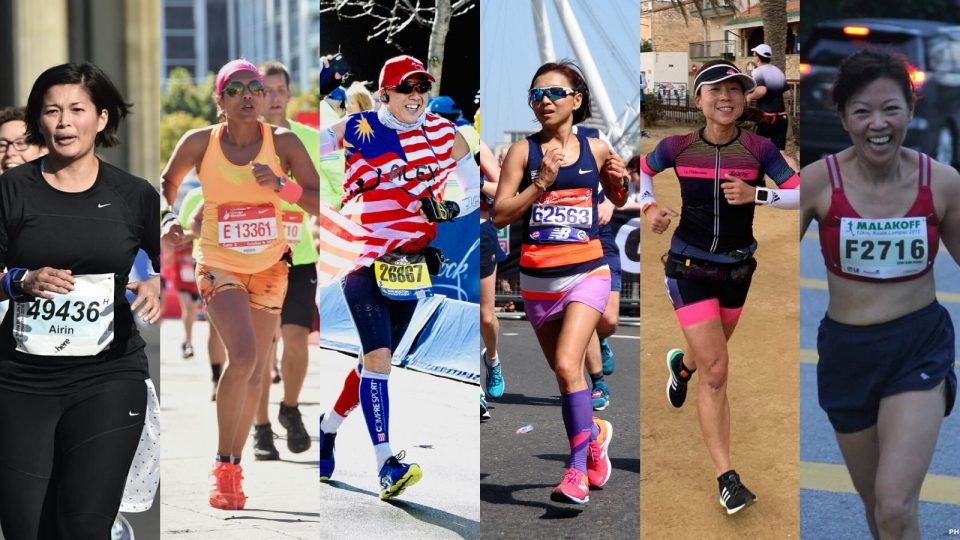Have you ever dreamt about winning your first Abbott World Marathon Majors finishers?
With these six popular races, you need to be strategic about your registration and plan months or years in advance, as you will need to train yourself to be marathon ready when the time comes. So, to cross this off your bucket list, you will need a few tips to help you get through.
RunSociety is proud to introduce our 6 elite marathoners who completed their 6 World Marathon Majors, and they will be sharing all the details on how to push yourself to be strong and confident to run all six of them!
With their help, you are sure to win your first Abbott World Marathon Majors finishers in no time.
So, let’s get on with it and listen to their motivational stories.
What is a 6 World Marathon Majors?
The Abbott World Marathon Majors is a series of six of the largest and most renowned marathons in the world: the Tokyo Marathon, Boston Marathon, London Marathon, Berlin Marathon, Chicago Marathon and New York City Marathon.
These events are united in raising awareness of elite athletes and increasing the level of interest in competitive marathon racing among running enthusiasts.
For athletes or runners across the world, competing in an Abbott World Marathon Majors race is a significant accomplishment. Once you have successfully completed the six events, you will earn the Six Star Finisher Certificate and Six Star Finisher Medal.
What is the requirement to qualify?
Each World Marathon Major race has its own qualification. If you don’t meet their requirements, you can try this to get in:
- For starters, each race guarantees entry to runners affiliated with certain charity partners, so check them out in each race’s website for more, and in a lot of cases, that’s your best bet if you did not qualify via the lottery.
Which is the hardest race to run?
Every race has its highs and lows, so it is important to do your research before you race. Boston and New York have a hilly road among the others. As for London, there are a lot of 90-degree turns, and Tokyo normally can be rainy. Last, for Berlin and Chicago, the road surface is flat.
What do you get after you finish all six of them?
After completing all six World Marathon Majors, you will receive a medal, a certificate, and major points. Normally, it might take years to complete the World Marathon Majors. So, if you are halfway in your journey, stay positive, and for sure, you will complete them all.
Hear from 6 Abbott World Marathon Majors finishers
1. Airin Zainul
Bio: Malaysian, 46 years old, Director, IP-Animation and Licensing & Merchandising
Started running at the age of 39 to initially manage stress, but eventually fell in love with it and decided that she wanted to run and travel at the same time.
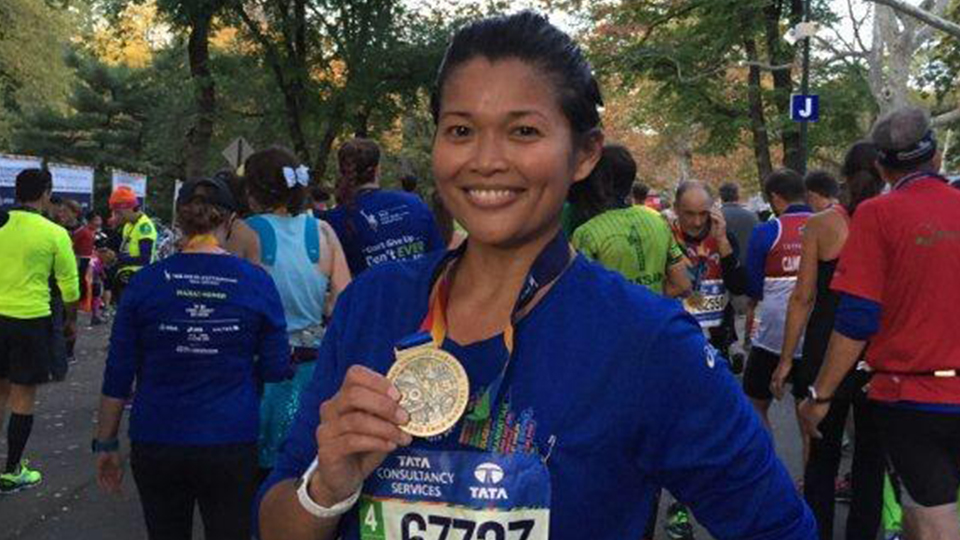
RS: Running for 6WMM is a big deal for all runners. What made you want to do all six of them?
Airin: It’s the grand slam of marathon running, and I set a goal that I wanted to complete the WMM before I turned 45. In order to claim the WMM medal, you need to complete all 6.
RS: It is a tough journey to complete the 6WMM, so how do you prepare and train yourself to complete all of them?
Airin: A lot of sacrifice in 5 years that I was running/training for the WMM. Long runs every weekend meant that I missed having breakfast with my family. Not going out on Friday nights so that I could sleep early to run the next morning.
My training consisted of an average of 100km per month, so I would break it up at the weekends. Sometimes, 10kms and 21km during the weekends. On weekdays, I would try to squeeze in 5-10km 2-3 times a week.
RS: What kind of obstacles did you meet to complete the 6WMM? How did you overcome them?
Airin: Keeping consistent with the training. Sometimes, if I had to travel for work, that would disrupt the training schedule, but I’d bring my running gear and try to run as much mileage as I could.
Injury and recovery are also other challenges, and I tried to respect the recovery period so that I could get back to training. Getting the necessary rest is very important, too.
RS: What is the most important factor to complete the 6WMM?
Airin: Time and budgets are important factors, as they are in different cities. It was a great personal achievement for me, and I’m humbled that I managed to finish it.
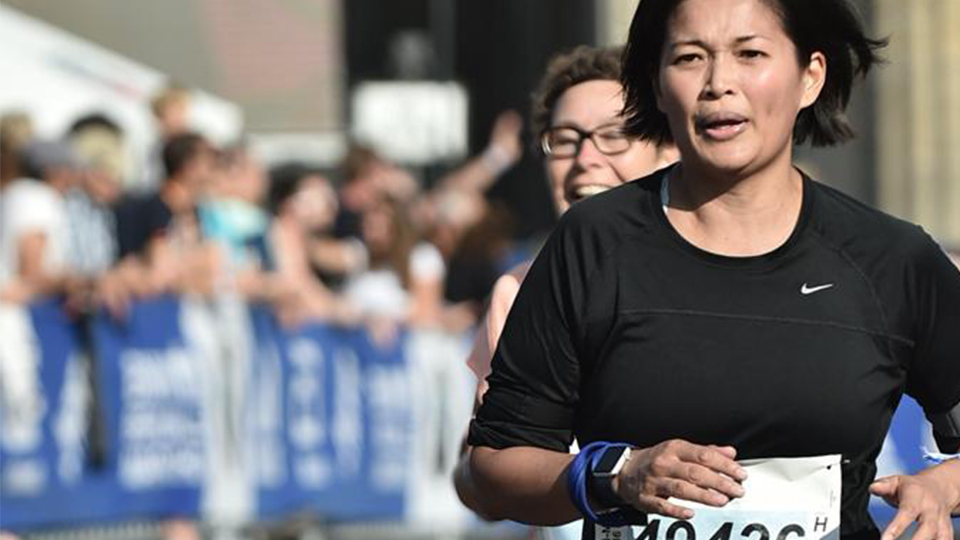
It was a great personal achievement for me and I’m humbled that I managed to finish it.
WMM 6 Star Finisher: Airin Zainul
RS: Are there any valuable tips for runners who want to complete the 6WM?
Airin: Stay focused and patient. Getting into the WMM can be challenging, whether it’s for a ballot or charity.
RS: What is the feeling like once you completed the 6WMM?
Airin: What do I do now? I had withdrawal symptoms once the “joy” faded, as when I set my mind to complete the WMM, I had a certain discipline. Once you have completed it, you have to start looking for another goal.
RS: After 6WMM, what are your short- or long-term goals?
Airin: Hard to say, as I’m still trying to find other challenges to take on. I do continue to run and sign up for marathons.
RS: What does running 6WMM mean to you?
Airin: It was a great personal achievement for me, and I’m humbled that I managed to finish it. Part of the sacrifice is time away from the family and also, to some extent, social time, too.
You can follow Airin on Instagram: @airincupcakery
2. Alex Goh Shaw Peng
Bio: Malaysian, 59 years old, Corporate Consultant
Semi-retired, running his own Corporate Consultancy firm based out of Singapore. Alex is a senior corporate C-suite level executive with many years with MNCs (in Oil and Gas and Heavy machinery industries). He spent many years based overseas, with 8 years in China as well.
He also enjoys extreme sports, holds the Malaysian Book of Records for the First Malaysian to complete top 10 world marathons, and the author of two travel-related books, “My Heritage Journey” and “200 Weekends In China.”
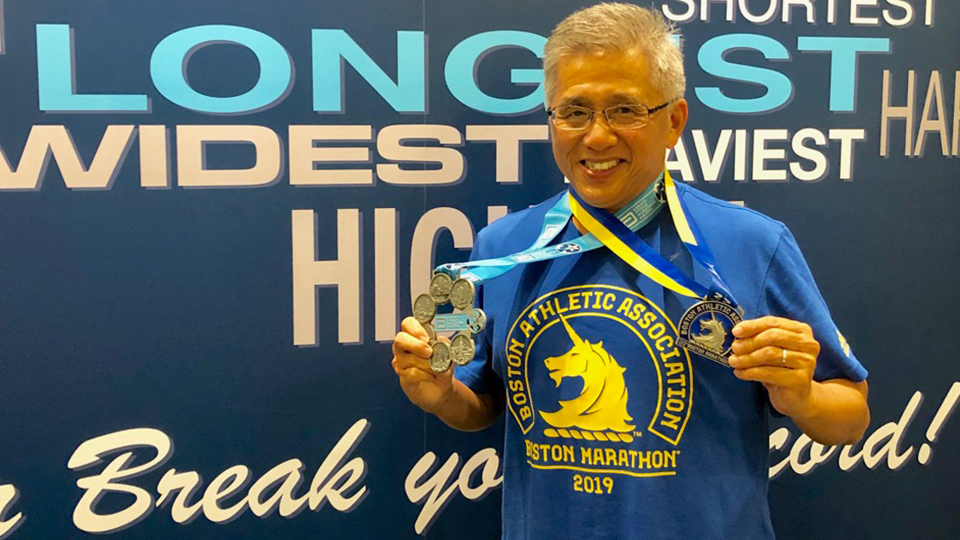
RS: Running for 6WMM is a big deal for all runners. What made you want to do all six of them?
Alex: Running has always been my passion since school days. I started running official races in 1998 and moved up the challenges over the years until I found that it complemented my other passion of travel and photography.
In 2013, I ran my first WMM in Tokyo and when they introduced the 6 Star medal in 2015, I decided I just had to have that in my medal collection. So, it started a journey of pursuit of all 6 WMM races and medals and ultimately, join the wall of fame of the very few WMM 6 Star finishers.
It is a life goal to drive me to stay focused and achieve them.
RS: It is a tough journey to complete the 6WMM, so how do you prepare and train yourself to complete all of them?
Alex: Having to run many marathons, completing the 6WMM races itself is not much of a problem. The issue is getting to the Start Line of these prestigious races. The competition is very intense, with a very slim chance of getting a slot.
The feeling of getting a slot among the running community is almost like winning the lottery. Very tough. However, if one is prepared to work with some charities and help raise monies, then the chances of getting a slot are slightly better.
I ran for charities in all my 6WMM races–charities ranging from visually impaired children, cancer prevention, scouting, and UNHCR Human Rights organisation. It makes the run more meaningful.
In NYC, I ran with a sports tour company. As part of my fundraising exercise, I managed to raise the funds through the sale of my books.
RS: What kind of hardships you go through to complete the 6WMM? If you do, how do you overcome them?
Alex: As I mentioned above, five of my WMM were in support of charities. The challenge is to convince family and friends about my mission and goal and part with their money in support of worthwhile causes.
In addition, most of these races are very competitive, and given the effort that went into getting to the races, I always use that to put in a good race. I’m pleased to say that I managed to achieve my personal best timing at three of these events: Tokyo, New York and Boston.
RS: What is the most important factor to complete the 6WMM?
Alex: Apart from getting a place at these prestigious races, it’s the training and making sure we are injury-free and in top form for a good performance on race day.
Case in point; I had a bad fall two weeks before Berlin and ended up with a sprained ankle.
After much therapy and massage, I still managed to make it to the race but could only run cautiously. It was one race I am happy just to be able to finish and get my medal.

I am using my stories and achievements to motivate the younger generation to believe in themselves and have dreams and the courage to pursue their dreams.
WMM 6 Star Finisher: Alex Goh Shaw Peng
RS: Are there any valuable tips for runners who want to complete the 6WMM?
Alex: Getting a slot to participate in these 6WMM races is very competitive and intense. Be prepared to deploy alternative channels like running for charities. It may be a good mission, too, as one feels good raising money for the needy and yet able to indulge in one’s passion. You must plan ahead.
RS: What is the feeling like once you completed the 6WMM?
Alex: My final 6WMM Star happened in Boston. It was an exhilarating feel, as I ran the last 200 metres along the famous “right on Hereford and left on Boylston St” to the finish line.
I had planned the Malaysia flag outfit, and I made sure I remembered to take out my Jalur Gemilang and let it flutter in the wind as I made it to the finish line. It was even more poignant because I knew that in addition to the 6WMM, I would be making history for Malaysia as the first Malaysian to complete all Top 10 World Marathons.
RS: After 6WMM, what are your short- or long-term goals?
Alex: I keep telling everyone that after my 6WMM and Malaysian record, I will take it easy and run some fun race locations. The pressure is off, and I just want to run at nice locations around the world and enjoy the journey. However, if I still can, I do have a couple of ‘nice to have’ goals.
First, I feel at age 60, I can still run in 5:30 hr. Second, I am slowly moving into ultra runs and had tried a few of these in the last five years. I feel I can still do a 100km ultra run. Let’s hope my heart and legs stay strong and perhaps allow me to achieve these ‘nice to have’ personal goals.
RS: What does running 6WMM mean to you?
Alex: : I see the 6WMM as a journey, a chance to stay focused, disciplined and organised, in addition to being a healthy activity.
Also, I am using my stories and achievements to motivate and inspire others, especially the younger generation, to believe in themselves and have the dreams and the courage to pursue their dreams.
Hopefully, many will be able to read my story and be inspired to embark on an exciting life goal pursuit.
You can follow Alex on Facebook: @Alex Goh
3. Bhumika Patel
Bio: Indian, 45 years old, IT Professional
Bhumika Patel works on Cyber security as a Global Program Manager at IBM. She was voted as Game Changers 2017 by Women’s Running magazine USA, an elite list of 21 women transforming the world through running.
Six star world marathon majors finisher and profiled by world marathon majors who credited her with sparking a revolution in women’s running in India. Bhumika started her running in 2009 at the age of 35 yrs.
After earning herself first place in a 4km race in her first run, she decided to pursue running more seriously. She won many national medals and participated as a World Masters Athlete.
With her progress, she had a vision of not only representing her country and winning medals, but also in imparting gratuitous training to hundreds of women & Specially Abled across India.
She was recently awarded for outstanding contribution to nation-building through promoting health and fitness in youth by the Hon. Governor of Maharashtra State of India.
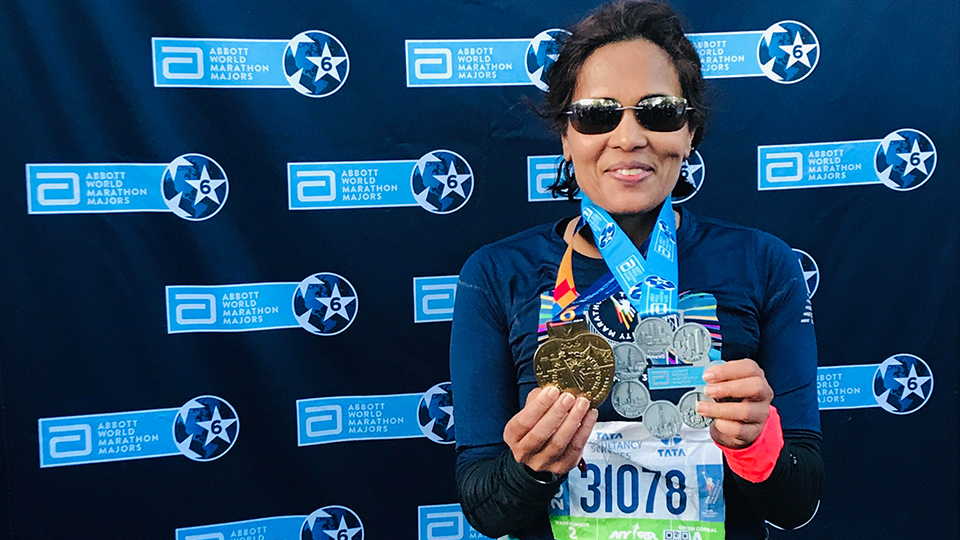
RS: When did you complete all 6WMM?
Bhumika: I completed 6 world majors in November 2019 with the New York Marathon.
RS: Running for 6WMM is a big deal for all runners. What made you do all six of them?
Bhumika: When I started running 4km, it felt like a marathon. The London Marathon was my first world major and I remember being most scared and jittery at the start line until 32 km into the race despite all the training.
The final few kms went in a jiffy and when I finished, it was like an awakening. I wanted to explore running in different countries of the world and meet people.
Apart from the 6WMM, I have also done a few others like Dubai, Copenhagen and the Frankfurt marathon.
RS: It is a tough journey to complete the 6WMM, so how do you do all of them?
Bhumika: It required a great amount of discipline and meticulous planning. I started with the flat course races, like London and Berlin, with great weather and a faster finish.
This boosted my confidence to continue training for more. Both me and my husband are passionate runners, with our daughter joining us on most of our trips. We would look forward to training hard and travelling to these wonderful cities to run with incredible runners from around the world.
RS: What kind of hardships you go through to complete the 6WMM? If you do, how do you overcome them?
Bhumika: One of the biggest difficulties I faced was to do long runs, which had to start early in the morning when it was very dark on the roads. Safety was a concern, and I was afraid to run alone.
Finding a running buddy was quite a task. I overcame this by shifting to a late morning start, which meant I had to finish the run with a lot of sun. Eventually, I got used to it.

It is much more than just running six marathons. It has helped me, explore the highest level in me.
WMM 6 Star Finisher: Bhumika Patel
RS: What is the most important factor to complete the 6WMM?
Bhumika: The most important factor is planning and adherence to the plan.
RS: Are there any valuable tips for runners who want to complete the 6WMM?
Bhumika: There is no time limit to complete the 6 majors. If one is really serious about becoming a Six Star Finisher, one should be ready to plan years in advance.
Keep trying to enter the lottery for each race, check time qualification standards, run for charity or through an approved marathon tour group.
RS: What is the feeling like once you completed the 6WMM?
Bhumika: It was an overwhelming feeling of achievement. It felt like the Top of the World.
RS: After 6WMM, what are your short- or long-term goals?
Bhumika: : My short-term goal is to switch to shorter races 5k and 10k and recover. Long term is to repeat the 6WMM again.
RS: What does running 6WMM mean to you?
Bhumika: It is much more than just running six marathons. It has helped me explore the highest level in me. It is liberating.
You can follow Bhumika on Instagram: @bhumika.patel1
4. Annie Teo
Bio: Singaporean, 48 years old, Sales
Annie has been on an active lifestyle since young. She started picking up long distance running during undergrad days.

RS: Running for 6WMM is a big deal for all runners. What made you want to do all six of them?
Annie: I completed my first overseas FM on the Gold Coast and also achieved my first sub4 in 2014. This marked my turning point to chase after the 6WMM.
At that point, my two girlfriends also signed up with this idea, and soon, it became our vacation while pursuing our dream.
I honestly thought it could be done as long as I put in hours of training and at the same time maintain the high level of athleticism that this dream demands.
RS: It is a tough journey to complete the 6WMM, so how do you prepare and train yourself to complete all of them?
Annie: I started off on my preparation for Tokyo Marathon 2015 by training with running clubs, such as Team Fat bird, NB Run and Running Department.
It was a cheap avenue to ensure I run regularly to keep the minimum mileage of 42km. Every Saturday has always been a long run of 2 to 3 hours. I also joined local races as part of my race preparation.
After the Tokyo Marathon and also inspired by my girlfriend who qualified for Boston that race, I knew that what I’d been doing was just not sufficient. I began to seek ‘professional’ help.
A kind friend provided me with a training plan that incorporated two aspects that I’d never done, one being speed work and the other was a tempo run. These were proven important and effective as I improved by leaps and bounds.
Finally, I finished 3h 50mins in the Gold Coast Marathon 2016 to BQ under my age group after 4 months of highly disciplined self-training. I stuck to the same plan that shaved me another 4 mins in the Berlin Marathon in 2016.
Due to my demanding work and travel, I needed a smarter way to train, given running in the gym was my only avenue on weekdays. I decided to go under the coaching programme of Jon Fong of MorphPerformance.
Through his programme, I only trained optimally, but I’ve learnt how to be a smarter athlete when the data information relating to my performance became part of how I review and evaluate each training cycle and race to stay injury-free and maximise recovery.
I believe that every athlete must learn to understand one’s body and ability to fuse in the right level of training regime.
From preparation to completion of Boston 2017, Chicago 2017, New York 2017 and finally, London 2018 has never been so blissful than before.
RS: What kind of obstacles you go through to complete the 6WMM? If you do, how do you overcome them?
Annie: The biggest obstacle for me is time. As I mentioned, I’m on a regional role and travel almost weekly. I’ve had to balance the right amount of time on training and yielding performance. That’s why MorphPerformance provided me with a good platform to train efficiently and optimally.
RS: What is the most important factor to complete the 6WMM?
Annie: You must first believe this is your dream to instill your self-discipline and perseverance. It was a journey for me, and without the passion in wanting this 6WMM, this would have been another fantasy.
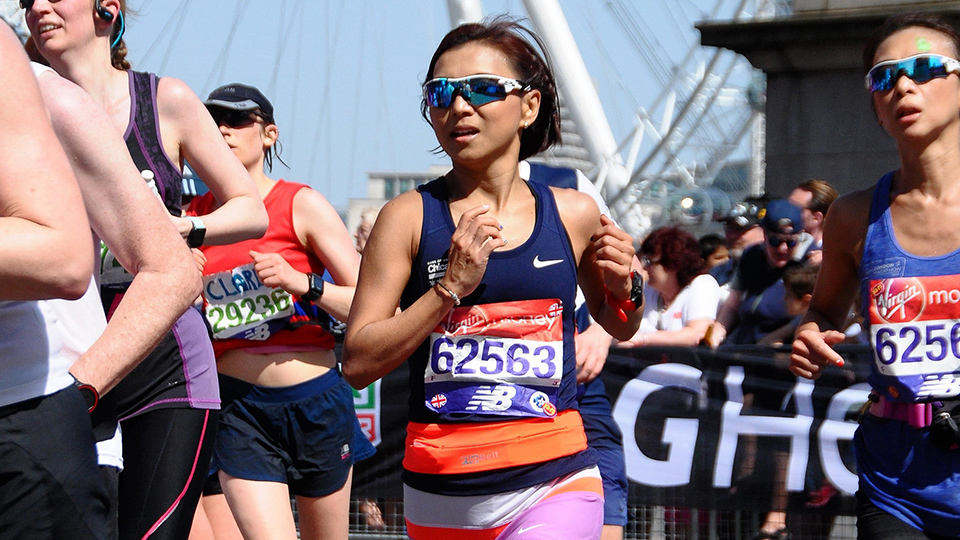
Running a marathon assured me that running has no age barrier.
WMM 6 Star Finisher: Annie Teo
RS: Are there any valuable tips for runners who want to complete the 6WMM?
Annie: Train hard, but remember to recover well, too, after each training block. It is important to recover well to ensure you’re injury free.
Put in an effort to understand your body as when race nutrition will help you best. Lastly, you need to save money because it is not cheap to make those trips.
RS: What is the feeling like once you completed the 6WMM?
Annie: In total elation because all the hard work had been paid for. I also had a little sense of loss about the next big thing I wanted to go after.
I was really hoping that the 9WMM would have been formed so that I could continue this journey.
RS: After 6WMM, what is your short- or long-term goals?
Annie: The long term is to be able to run till I can’t run into my old age. I’m not so specific, but ever since 6WMM, I’ve been engaged in trail running and participated in a handful of trail races. I’m enjoying it and thought I could loiter in this backyard for a while.
RS: What does running 6WMM mean to you?
Annie: It means a lot to me because it proves to myself that if I want it, I can do it. It also assured me that running has no age barrier. I’ve been a better runner as I’ve grown older. It is my pride that I earn it.
You can follow Annie on Facebook: @Annie Teo
5. Maggie Kim Hong Goh
Bio: Malaysian, 56 years old, Consultant
Maggie is a keen runner and ardent cyclist. She started her journey in sports 3 months after she had her second baby at the age of 35, then a full-time mother and home.
She has never looked back and never stopped her exercise regime since that very first day until today, and it’s been 22 years.
Maggie’s running journey has many ups and downs, but it never failed to make her a better runner and athlete. Her motivation will have to be her two children.

RS: Running for 6WMM is a big deal for all runners. What made you do all six of them?
Maggie: All my 6WMM were doing 2 in each year starting from 2008 and spanned 7 years and completed in 2015. When I ran my first 2WMM, namely the London Marathon, then a week later, the Boston Marathon back-to-back, I never thought about them much. In order to cut the cost down, I ran both a week apart, so I don’t have to travel 2 times for them.
As a matter of fact, I have qualified for Boston since 2003, when I ran my 4th marathon. Like everyone else, I must save enough money to be able to afford the entry and travel to these WMMs.
In 2014, I had the opportunity to run the Tokyo and Chicago Marathons after securing entries. After completing the Chicago Marathon, my dream became vivid, and I wanted to be the first Malaysian to complete the 6WMM.
In June 2015, I had a major hurdle. I had open operations on both my knees. I was brave enough to take up the challenge and did physiotherapy and continued to rehabilitate both my knees, including healing the massive 8 cm and 5 cm cuts on both my knees, respectively, in preparation for the final 2WMM in 3.5 months after the operations.
Finally in 2015, I ran, having had a special invite to the Berlin Marathon and qualified by timing to get an entry for the New York City Marathon. Hence, I completed all 6WMMs in 2015.
RS: It is a tough journey to complete the 6WMM, so how do you prepare and train yourself to complete all of them?
Maggie: Everyone approaches full marathons in very different ways. Everyone has different targets for running a marathon, whether it’s a WMM or just a marathon.
There are basically two types of approaches to running marathons. One is running the best timing, and the other is social marathon running. I belong to the old school where I believe I want to run a marathon.
In preparation for every single marathon I have ever completed, I followed the rules, which I set up myself suitable for me.
Everyone has a different commitment and capability, almost no one person is the same. For myself, I am a busy mother with a full-time job.
Here is my schedule:
- A good and suitable training schedule with a specific weekly mileage.
- A good eating plan and correct nutrition.
- A plan for strengthening physically and mentally. Bearing in mind, marathon running is endurance running. It needs a strong mind.
RS: What kind of hardships do you go through to complete the 6WMM? If you do, how do you overcome them?
Maggie: There were two hardships I went through during the periods of my WMMs
- In 2009, I had my first double keyhole operation on both knees due to thinning of cartilage on both knees. The operations were not successful, so I was unable to run for 2 years. I then started to change my running technique just like we relearn a new language. With that, I was able to start running in full marathons again.
- In 2015, I had my second double open operation on both knees again. The operations were successful, so I was able to recuperate with the correct rehabilitation and physiotherapy and got to run the Berlin marathon 3.5 months later and then the New York City Marathon 1.5 months after the Berlin Marathon.
RS: What is the most important factor to complete the 6WMM?
Maggie: We all know that without good training and qualifying time, you will not be able to complete all the 6 WMMs. You may be able to run 5 of them, but you will need to qualify for the Boston Marathon.
It is the world’s only marathon where you must qualify with a specific time before you can register to ballot for the Boston Marathon.
Of course, if you can make or collect enough donations for any one of the WMM, you can also run them. As a proud runner, you will always want to enter to run the Boston Marathon by qualifying for it!
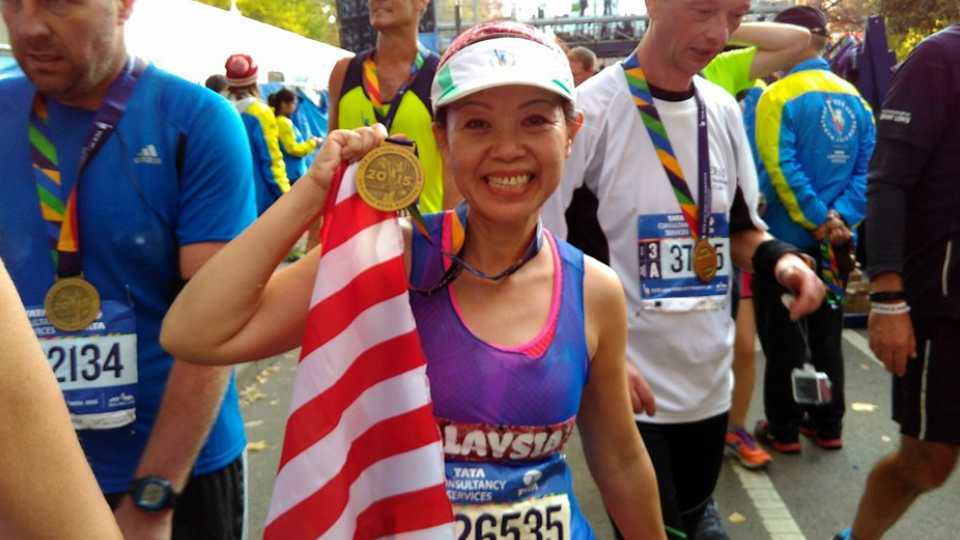
I hope that with this achievement, I can be a good example to my children in their pursuit of their dreams.
WMM 6 Star Finisher: Maggie Kim Hong Goh
RS: Are there any valuable tips for runners who want to complete the 6WMM?
Maggie: There are a few tips that can be applied to complete these 6WMM:
- Running a good marathon and finishing well requires training and patience.
- Train well so that when you are running the 6WMMs, you can also enjoy the full 42.2 km. After all, you have to go across the world to get to the start line.
- I believe the most important part about running a marathon, whether it’s a WMM or not, is the spirit of camaraderie, the friendship we create while on the journey to the WMM. The training makes us a different person and a better person. So make as many running friends as you can along the way.
- Talk to your family about your dreams and aspirations to achieve 6WMM. Tell your children how you are planning to “do it.” Involve your family, so they will form part of your journey.
RS: What is the feeling like once you completed the 6WMM?
Maggie: It was November 9th, 2015, when I crossed the finish line of the New York City Marathon. The feeling and sense of achievement was tremendous! So much so, I had tears in my eyes, and this was simply shared with the runners around me.
They may be strangers, but we ran the marathon, and we crossed the finish line together. We were no longer strangers. We were finishers.
It was very important to me because I knew I had created history, not just for myself being the first Malaysian to complete the top WMM but for all Malaysian women.
I was not just the first Malaysian woman but also the first Malaysian to complete it. In sports, men being stronger have always been the first or the fastest. In this case, a woman becomes the first and the fastest to achieve this! This speaks a lot.
Finally, my feeling of completion was tremendous because I had such massive obstacles leading to completing the top 6WMM! I was only 3.5 months after the double operations.
For normal people, it would have taken at least 6 months just starting to run, let alone run a full marathon, and I was able to run Berlin in 3.5 months and 5 months to complete Berlin and NYC marathons!
Of course, I am mighty proud of myself. I would be proud of anyone who could do this, too.
RS: After 6WMM, what are your short- or long-term goals?
Maggie:
My aim upon completion of 6WMM is to continue with my sport. My running dream in telling this story to all who I know with the purpose of inspiring all runners that if I can do it, they can, too. To make other runners know if we plan and train well, we all can excel in sports – running in particular.
In return, when these runners achieve their targets, they will inspire me.
I hope that with this achievement, I can be a good example to my children in their pursuit of their dreams. That we must have a dream, and that the dream can come true!
RS: What does running 6WMM mean to you?
Maggie: Running 6WMM is a way for me to realise my dream of running great marathons of the world. Running 6WMM is my dream; therefore it is realising my dream.
Running 6WMM is my way to visit and see the cities and countries as a form of travel. Running 6WMM is my way to meet other runners with similar goals and dreams. Why? Because I am a marathoner! Simple as that!
You can follow Maggie on Facebook: @Maggie Kim Hong Goh
6. Quek Chiu Lian Jennifer
Bio: Singaporean, 48 years old, Accountant
Jennifer never thought she would run a marathon, as she’d never run during her school days or even when she left school. Her first contact with fitness training was combat and step board classes in the gym.
Through some gym friends, she started running at the Singapore Standard Chartered half marathon in 2008 (only at 36), and she remembered the crowd was cheering loudly for the full marathon runners at the finishing line.
Looking at crowd support, she wanted to do a full marathon next year instead. She also ran at the Singapore Standard Chartered Marathon in 2009 and had an opportunity to join as a marathon pacer in 2010.
In the pacer group, she gets to know more runners, and they share their training and experience. David Tay, the leader of the pacer group, started the idea of running overseas races together.
She started with the Tokyo Marathon in 2011 and discovered different crowd support and fantastic atmosphere, which triggered her wanting to explore more overseas runs.
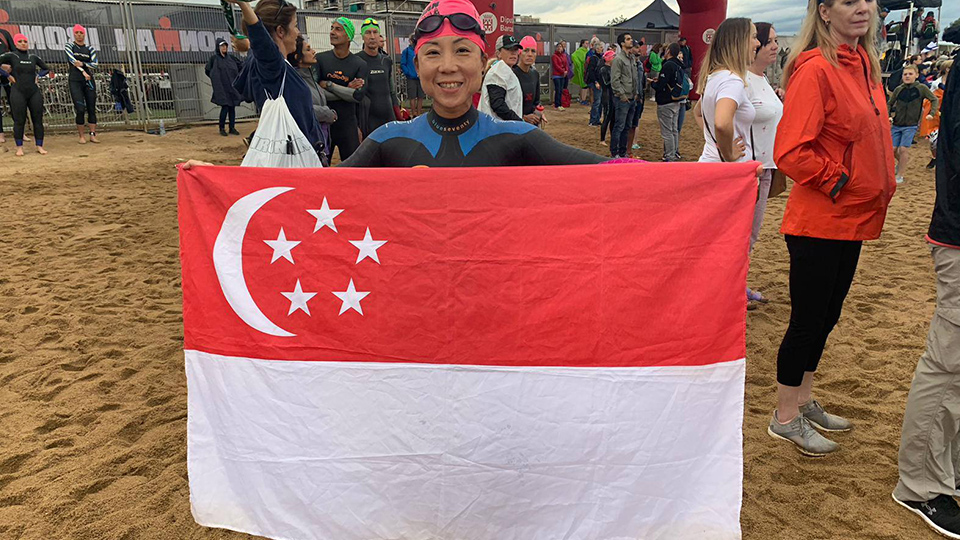
RS: Running for 6WMM is a big deal for all runners. What made you want to do all six of them?
Jennifer: My first WMM was the London Marathon 2012. I felt like I’d hit the lottery. My pacers team (15 of us) applied for the ballot, and I was the only one who got it.
Two of my pacers team members (Luke and David) were very supportive and decided to run with me by getting their slot through raising funds for charity. It was tough, as they need to raise 2500 pounds each.
At that time, I didn’t see WMM as a big deal, as I am a sub 5 runner, and I could never qualify for Boston, and it was impossible to complete all 6WMM. And I completed it with the timing of :18:51.
After my Berlin Marathon in 2013, which I clocked 3:48:34 (my first sub 4, that give me the confidence to challenge the Boston qualification timing.
RS: It is a tough journey to complete the 6WMM, so how do you prepare and train yourself to complete all of them?
Jennifer: All the while, I am training with my pacer team with a self-designed training plan, which includes some daily mileage and a long slow distance (LSD run) during the weekend.
Very basic and relaxed training. However, there was not much improvement in my timing, no matter how hard I trained.
In late May 2013, I was introduced to Coach Rameshon, one of Singapore’s top marathoners, as I felt that if I wanted to improve, I needed to make some changes. So, I decided to seek professional training programs. I shared with him my goal (sub 4, anything 3:59) for the upcoming Berlin Marathon on Sept 2013.
Technically, I had only 3.5 months to train, and I did not place high hopes that I could achieve my goal. However, without even seeing me personally, Coach Ram was very confident I could achieve this.
When I first started with him, I found that his training was quite basic. Some are just warming up, 5km run and cool down.
Later on, we moved from 5km run to 8km, 12km and then restarted again from 5km. The cycle then repeated. I started to doubt him. Could I really do a better timing with this? The booster came when he signed me up to the Army half marathon for as a time trial. I did 1:51 to my surprise.
My PB (personal best) and my first sub 2 in half marathon after 2 months of training. Thereafter, I followed his training program “religiously” with interval, speed work and some other strength and recovery trainings.
As an accountant, I recorded my training program in an Excel spreadsheet like my work. I monitored and kept track of my mileage, as I needed to clock 100-120km weekly, meaning that I needed to run an average of 15km daily and a 36km long run on weekends.
This is physically taxing, and at the same time, I needed to allow recovery between each run. Planning becomes very important and critical in the program.
On top of that, I also needed to watch my diet closely, as I was on the heavy side, weighing at 52kg. The coach encouraged me to drop my weight, which is tough as I needed the energy with the taxing training as well.
I was on a “Sweet Potato Diet,” where I only ate one sweet potato at each meal. Finally, my weight dropped to 48kg before the Berlin Marathon.
RS: What kind of challenges did you face to complete the 6WMM? How do you overcome them?
Jennifer: The toughest challenge is time management. As an accountant, I’m always required to put in extra hours during the month end closing and year end closing, which took up a lot of my personal time.
Most of the time, I couldn’t get off on time for training, doing most of the work and training back-to-back. I continued to work at home until the wee hours after hard training. I remembered I was taking my dinner (an apple) while showering after a run.
During that period, my body lacked sleep. To make things worse, I had a plantar fasciitis injury for both legs due to high mileage. Every morning, I needed to endure the pain when my feet stepped on the ground.
Chasing for BQ (Boston Qualifying) timing was also a big challenge. I was 4 minutes away in my Berlin Marathon timing. Everyone encouraged me to chase for it. I trained and signed up race after race to chase it.
My friends and coach travelled and chased the timing together with me, from Paris, Osaka to Tokyo and finally, I qualified in Tokyo with 3:42:19.
RS: What is the most important factor to complete the 6WMM?
Jennifer: Support and understanding from family members and boss are the most important factors. Having a goal and working towards it alone is going to be painful and frustrating.
Through sport, my family sees my changes and changes their perception of fitness. My boss and colleagues even track my race timing and send congratulatory messages each and every race, which make me stronger after each race.
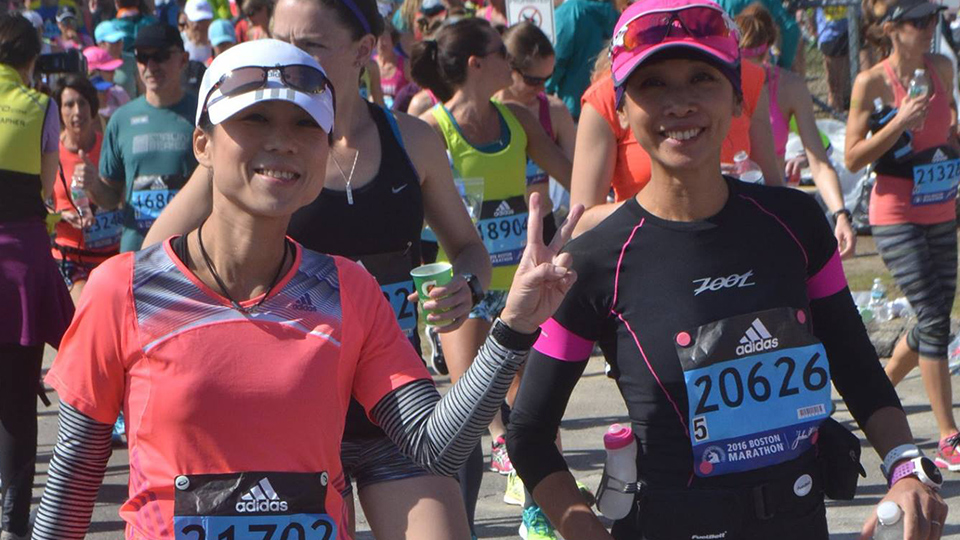
Never give a chance to say no to something new because through sports, we have the power to change our lives.
WMM 6 Star Finisher: Quek Chiu Lian
RS: Are there any valuable tips for runners who want to complete the 6WMM?
Jennifer: Get a training program and “plant a money tree” in your backyard (in a joking way). Planning is important, and booking air tickets and accommodation 6 months ahead could really help your pockets.
As we are in a different climate than the 6WMM countries, we need to be well-prepared with the gear for all weather. It can be extremely cold, heavy rain or even heatwaves. Always prepare your gear for three different types of weather.
RS: What is the feeling like once you completed the 6WMM?
Jennifer: : I know I’ll have withdrawal symptoms, so I had plans for what I should do next. Learning how to swim was my next challenge in 2017 at the age of 45.
Since I was young, I had a water phobia, which made learning to swim very difficult. It took me one year to learn how to swim at least swim 3km as a beginner.
Through swimming, I also discovered that it helped my recovery from plantar fasciitis injury.
At the same time, I also bought a road bike and did some cycling with my colleague and friends.
RS: After 6WMM, what are your short- or long-term goals?
Jennifer: Yes, I cannot stop venturing into new sports and started my first Ironman race in Barcelona in 2018.
It was my first time swimming 3.8km in the warm waters of the Mediterranean Sea, followed by a 180km bike course and ending with a 42.2km marathon, which is what I am always dreaming of.
In the short term, I hope to race as much as I can and one day to be able to qualify for Kona Ironman, which is much more competitive.
RS: What does running 6WMM mean to you?
Jennifer: We need to have dreams regardless of any age. Never give a chance to say no to something new because through sports, we have the power to change our lives.
You can follow Jennifer on Instagram: @queen43m
Are you ready to challenge the 6 World Marathon Majors? If you do, you might come across our elite 6 marathoners along your way.
Not ready to challenge a World Marathons Majors yet? No worries, you can sign up for an online marathon at Spacebib to train at your own pace.
What are the six world major marathons?
The Abbott World Marathon Major is the largest and most prestigious series of six marathons in the world: Tokyo Marathon, Boston Marathon, TCS London Marathon, BMW Berlin Marathon, Bank of America Chicago Marathon and TCS New York City Marathon.
How do you qualify for a World Marathon Major?
a
Each marathon major have a different qualifying time. A qualifying time may not guarantee you a spot at the race of your choice. You need to be over 18 years of age and the fastest qualifiers will be accepted first. Or you can join the race as being a legacy finisher, from a straight lottery or ballot entry.
What is the most elite marathon?
The world-famous Boston Marathon was first held in 1897 and is the oldest annual marathon in the world. Due to its history and reputation as one of the most challenging races, it’s on many runners’ wish lists, making it the most coveted race in the world.
Which of the 6 major marathons is the hardest?
Every marathon route has its ups and downs. But in general, Boston and New York have the most hills.



